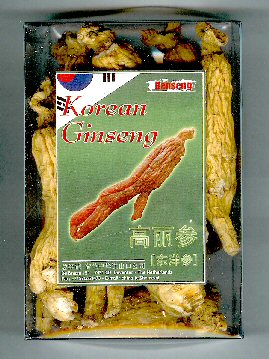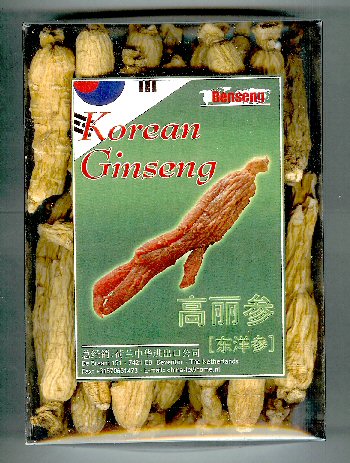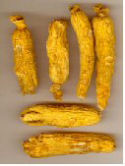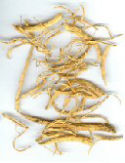White Korean ginseng - Roots
Processing
After the harvest, fresh White Korean Ginseng roots are washed with care, sorted and dried at a low temperature. This all to make sure that the content of active ingredients (ginsenosides) remain on a high level. It also secures the uniform beige color of the tissue in the root.The dried roots are sorted according to standardized specifications, but can be sorted to any shape or size a customer desires.
Composition of the roots
Despite common belief, it is not always the case that roots with a longer growth period are better than younger roots. The level of active ginseng-ingredients does increase gradually as the root ages, but it is the circumstances under which the plant develops that determine its ginsenosides levels.Different roots from one and the same piece of land with the same number of growth years and the same level of ginsenosides can have very different shapes and sizes. Therefore the larger roots don't necessarily have better qualities than the small ones.
The distinction between first and second grade is mostly based on visual aspects. Ginseng roots with (spots of a) divergent color, some damage or unattractive growth patterns are usually marked 'second choice'. The level of ginsenosides in first and second grade roots is equal and so is their strength.
Packaging
Normally any bulk quantities are packed in plastic bags in cardboard boxes or barrels.If desired smaller quantities can be packed in transparent plastic boxes.
| 180 gram | 500 gram | ||
|---|---|---|---|
 |  |
In smaller quantities White Korean Ginseng roots can be packed in transparent plastic boxes. | |
Properties
Different parts of the White Korean Ginseng roots contain different levels of ginsenosides. The tiny hair-roots or fibers contain 2 to 3 times more ginsenosides than the main roots. |
Average content of individual ginsenosides in various parts of the ginseng roots in one batch. |
Know that the mutual levels of the individual ginsenosides in the fibers slightly differ from those in the main roots. Due to this, theoretically the fibers could have a slightly different effect on the body.
 |
The relationship between the individual ginsenosides is slightly different between the various root parts. |
The taste of the White Korean Ginseng root can be qualified as bitter-sweet. As the level of ginsenosides rises, the root's bitter taste intensifies and the sweet taste declines.
 |
White Korean ginseng main roots "larger" size (product code: KWRX/LO) from which all secondary little roots are cut off manually |
 |
White Korean ginseng slender tails + fibers (product code: KWRFO) contain the highest level of ginsenosides. |
Dried White Korean Ginseng roots are rock-hard. Carefully heating them in an oven or microwave softens them, allowing them to be cut with a knife.
The active ingredients in Ginseng roots (ginsenosides) are heat-resistant, and are not damaged or lost in the heating process.
Dosage
For optimal therapeutic results of White Korean Ginseng roots, it is advised to take 30-60 mg of pure ginsenosides daily.The white Korean ginseng whole roots "mixed size" with slendertails / prongs, but without the fibers (product code: KWROO) contain an average level of about 1,5-2,5% ginsenosides. This would mean that a daily intake of about 2 tot 4 grams of these roots would be sufficient.
Practical experiences have demonstrated that activity and effects of Ginseng do not decline proportionally as the daily dose is lowered.
There is no dangerous (damaging) maximum daily dose, but 7 mg ginsenosides is considered as a minimal dose. If you take less than 7 mg a day it will most likely not contribute anything.
When mixed with other medicinal herbs, a lower dose of White Korean Ginseng might be sufficient.
 |
 |
| previous | next |
